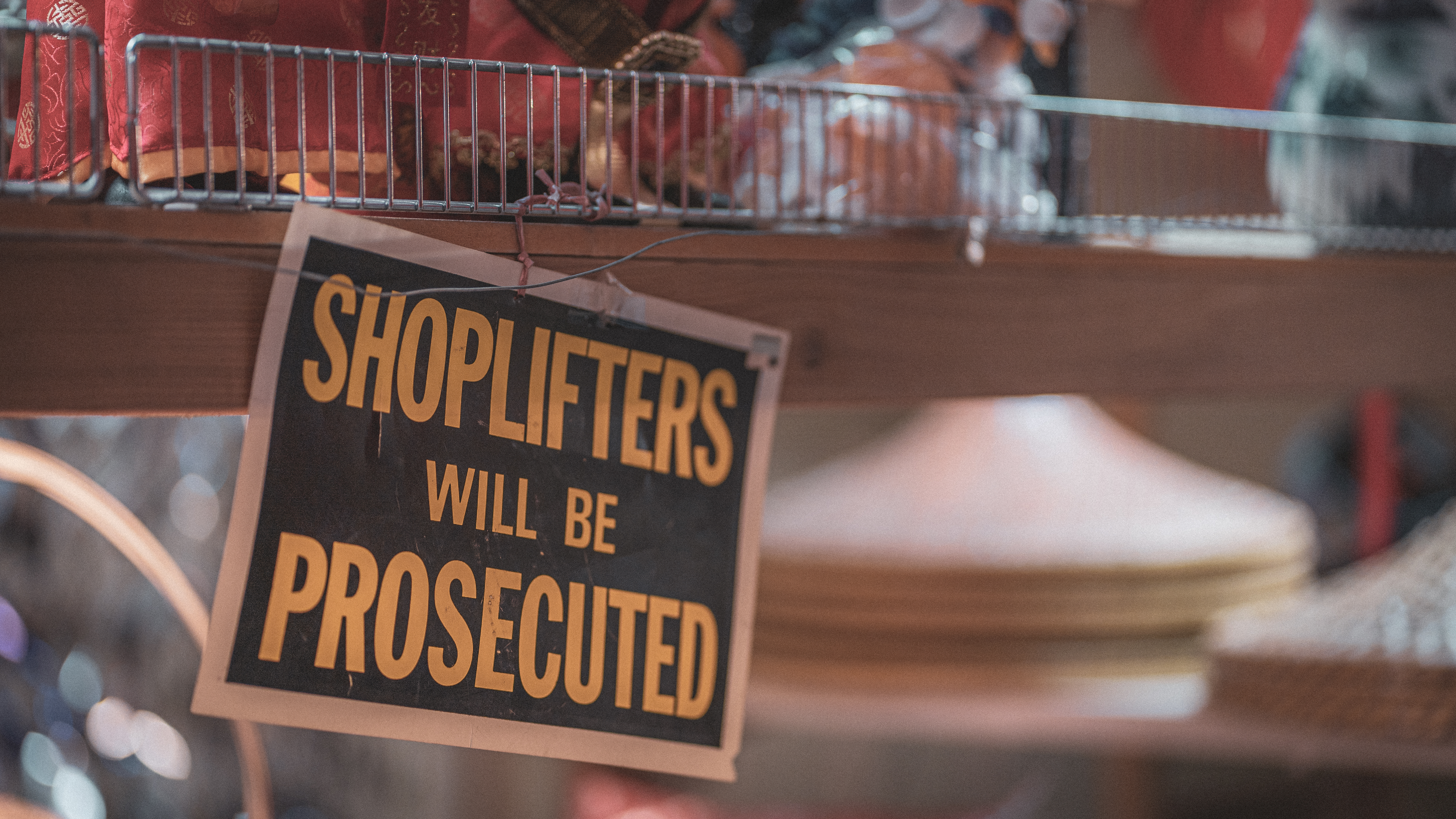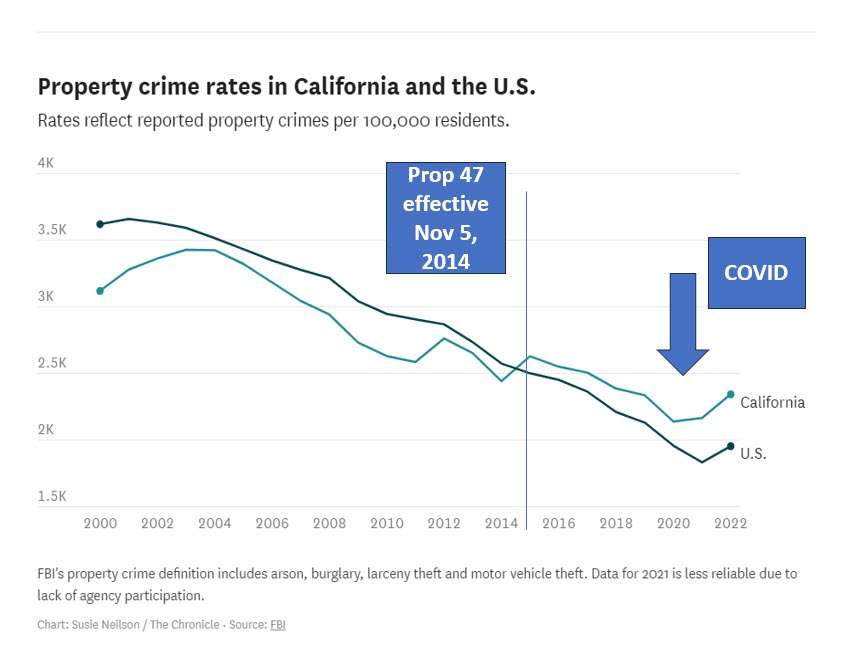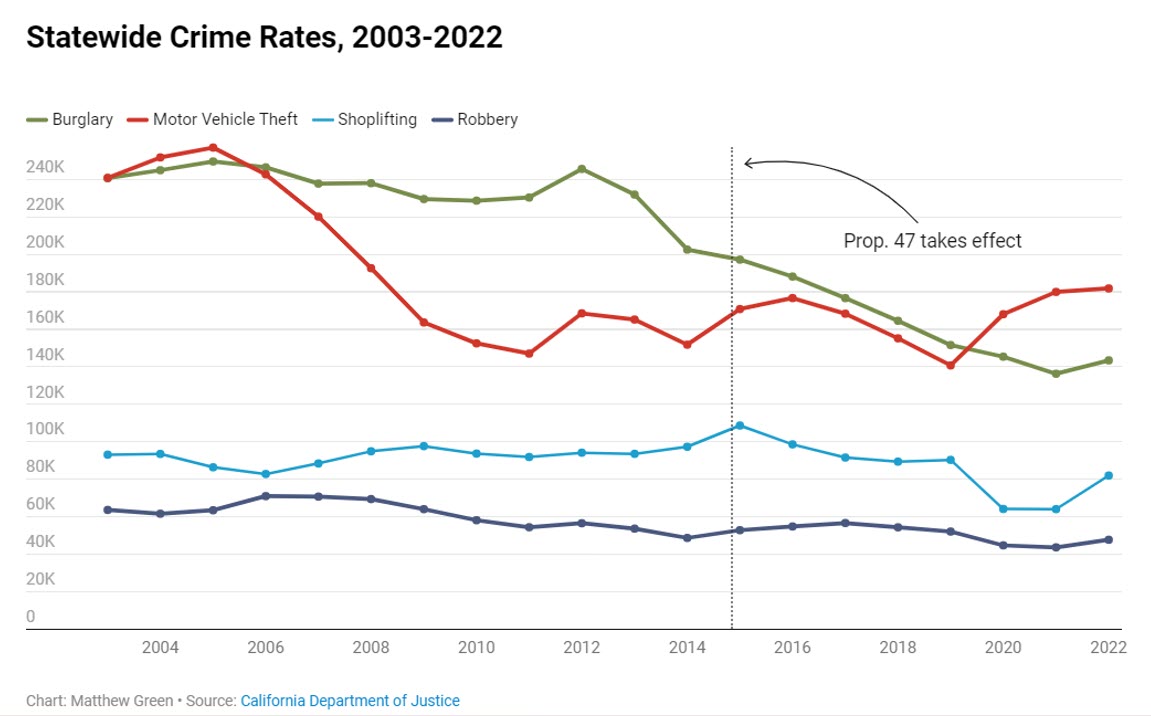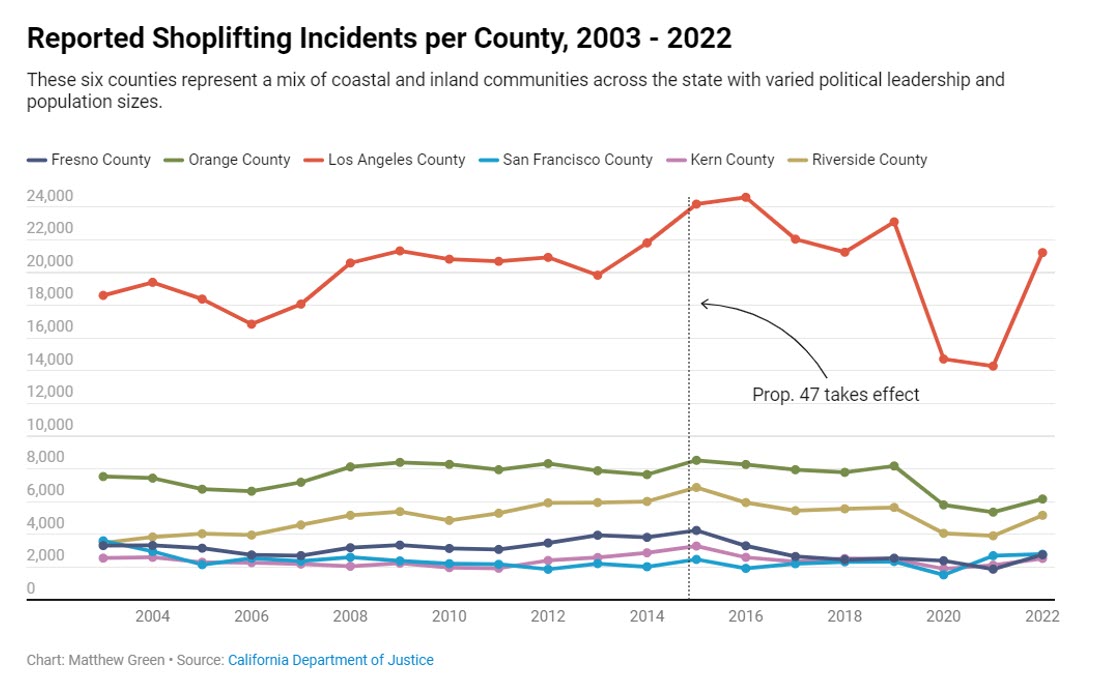
By David M. Greenwald
Executive Editor
“Lawmakers are overreacting to crime,” that was the basic headline in a column by Abdallah Fayyad, formerly a member of the Boston Globe editorial board, now a correspondent at Vox. He noted, “Crime rates are falling. Why are lawmakers passing tough-on-crime bills?”
Just before the pandemic, crime rates hit a 50-year low. But the chaos and disruption of the pandemic caused a sharp but what seems to be a temporary surge in crime. Even at the end of that surge, however, the crime rates were still near their all-time low, but you would never know it from talking to the public or watching the news.
Fayyad points out that in a Gallup Poll, “the share of Americans who believe that crime is an ‘extremely’ or ‘very serious’ problem afflicting the country recently hit an all-time high —63 percent in 2023, up from 48 percent just five years earlier.”
However, “the crime data paints a very different picture: According to the FBI, after an uptick in crime in the immediate aftermath of the pandemic, crime rates have actually been falling across the country, with murders declining by 13 percent between 2022 and 2023. In New York City, one of the cities Republicans often point to as a supposed example of lawlessness, shootings are down 25 percent, and homicides are down 11 percent.”
Nevertheless, lawmakers are responding to the public.
A recent article in the Los Angeles Daily News bears this out.
Reports the Daily News, “California politicians are facing new and mounting pressures to deliver solutions on rising rates of retail crime.”
They cite data that shows shoplifting jumped by 81 percent in Los Angeles from 2022 to 2023.
“The Legislature is responding to concerns of both the business community as well as the electorate; their citizens are complaining quite a bit because they have seen retail theft happen in person or on the news,” said veteran Sacramento lobbyist Chris Micheli. “We know this is a rampant problem and it is not getting better.”
Leading the way is Assemblymember Wendy Carrillo, who told the paper, “Right now there’re no consequences for individuals that continue to target our small businesses.”
But is that actually true? Many are blaming Prop. 47 which raised the felony line for petty theft. But while California’s rate is now $950—up from $400 where it had been 40 years before and had never been adjusted for inflation—that rate is still more harsh than in states like Texas and Florida. Texas’ rate is over $2000 for a felony.
California is one of only ten states where the threshold is less than $1000: “New Jersey has the lowest threshold in the country at $200. Illinois ($500), New Mexico ($500), FloridaS750), Hawaii ($750), Indiana (S750), Missouri ($750), Washington ($750), Vermont ($900), and California ($950) are also states where someone will be charged with a felony for a very small amount of theft value.”
The narrative, even among Democrats, has been that “shoplifting is out-of-control.”
But is that actually true?


 Those three slides show that while crime certainly went up in California during the pandemic, it doesn’t appear to be driven by Prop 47 at all. Instead, it appears driven by the disruption of the pandemic.
Those three slides show that while crime certainly went up in California during the pandemic, it doesn’t appear to be driven by Prop 47 at all. Instead, it appears driven by the disruption of the pandemic.
As the Vanguard has previously reported, the retail lobby has now admitted to overstating their claims.
For instance, in 2021, Walgreens claimed that shoplifting forced closures, but then the Chronicle reported, “The five stores slated to close had fewer than two recorded shoplifting incidents a month on average since 2018.”
The LA Times last year reported “[h]ow the retail lobby sold a $45 billion whopper about organized shoplifting.”
Reuters reported, “US retail lobbyists retract key claim on organized retail crime.”
The Walgreens executive, James Kehoe, admitted that “maybe we cried too much last year” over theft.
But still—there are efforts to roll back Prop. 47. In a recent presentation, Yolo County Public Defender Tracie Olson pointed out the need “to separate organized retail theft from Prop. 47.”
In contrast to the quote from Assemblymember Carrillo that there are no consequences, prosecutors under the current law are in fact charging people with felonies—all the time.
They use PC § 182—felony conspiracy, PC § 459—felony burglary, PC § 487—grand theft … not to mention some qualify under felony robbery (PC § 211) and under PC §490.4, organized retail theft.
Many of these big smash-and-grabs that you see on TV are actually grand thefts with value well over the $950 threshold.
So why is Prop. 47 a focus?
The Daily News reported, “While many Republican legislators have long called for repealing the measure, many Democratic lawmakers would prefer to create new ways to tackle theft without repealing Prop. 47 wholesale.”
“People basically say ‘all of this has happened because of Prop. 47, and their focus is on repealing Prop. 47 rather than actually thinking about what is it that we really need to do in order to stop the problem,” said Assemblymember Rick Chavez Zbur, D-Hollywood. “I’ve never thought that the issue was Prop. 47. I think what the data shows us that the issue is we have impediments to law enforcement doing their job.”
The article noted, “While the Democratic party has strength in numbers, it also has internal divisions over the best approach to tackle retail crime. While some legislators are ready to increase penalties for shoplifting, others believe doing so will reverse gains made on lowering the incarceration rates of Black and Brown community members.”
They cite Assemblymember Reggie Jones-Sawyer as being “among those sounding the alarm about bills that broadly toughen sentencing.”
“We have to be very careful that what we do doesn’t further criminalize a whole race of people just because we see the face of any crime as people who are of a darker hue,” he said. “Law enforcement has a tendency to want to go ahead and lock them up and we’ve got to make sure that we move away from that.”
A careful look at the data and a careful look at the problem suggests that Prop. 47 is not the problem, that Prop. 47 doesn’t prevent law enforcement from taking on retail theft—especially the organized and larger variety—and that Prop. 47 has simply become a scapegoat and a catchall for frustration.



Setting aside the political bias, setting aside the pros and cons of Prop 47. Ignoring the crime-data samples, samples that in themselves, show an inherent bias towards a political advocacy. Let’s bring this discussion of crime rates–perception and reality–to right here in Davis.
Forget murder statistics, the most infrequent crime in any jurisdiction. Instead we’ll focus on the most frequent and ongoing non-traffic crime in Davis, one that is rare enforced, more rarely prosecuted, and no longer officially reported due to the utter futility and waste of time in doing so. Shoplifting.
Here’s how you can find your own facts about the “perception” of rising crime in Davis. Follow your routine shopping pattern while patronize all the local merchants who display their wares on open shelves. Grocery stores, drug stores, clothing and apparel outlets, places you go to often. You prefer these places to photos on Amazon.com because handling and eyeball comparing is one the pleasures of retail shopping.
Discover for yourself about crime in Davis by chatting with the cashier, clerk, or manager. Ask them about how often people come in, grab a bunch of items and simply walk out with impunity. Then ask these clerks why they don’t call the police (ergo, lower crime rate), or confront the thief. They will tell you why, and why management says, do nothing.
Have you noticed more and more locked displays of premium items? Shoplifters have good taste, the seem to enjoy a $75 bottle of premium tequila. Installing cages and glass cases, along with a sign saying, “Display only, see cashier,” is costly for the retailer and annoying for the legitimate customer. The legitimate customer doesn’t want to hunt down a harried clerk with a key, and doesn’t buy the item and the store loses a sale. Put something behind a steel cage and sales for that item plummet.
As everyone knows in a free enterprise commerce like ours, retailers have to pass on their overhead cost onto the customer. Shoplifters don’t see the need to budget the items they take from the shelves, they let you and I pay for them. We pay, then complain about the inflation in our economy.
That’s a selective and subjective bias Phil. Locking products away is a good way of decreasing sales by increasing sales friction, especially since many retail stores have fewer employees on the floor than in previous eras. No wonder more people turn to online shopping.
2023 Retail Security Survey
The state of national retail security and organized retail crime
“Shrink or shrinkage is the measurement of losses calculated by a retailer during a specific period of time, categorized across various means of retail loss. This year’s study found that the average shrink rate in FY 2022 increased to 1.6%, up from 1.4% in FY 2021 and in line with shrink rates seen in 2020 and 2019. When taken as a percentage of total retail sales in 2022, that shrink represents $112.1 billion in losses, up from $93.9 billion in 2021. While retail shrink encompasses many types of loss, it is primarily driven by theft, including organized retail crime (ORC)….
While theft has an undeniable impact on retailer margins and profitability, retailers are highly concerned about the heightened levels of violence and threat of violence associated with theft and crime. Retailers’ top priority remains providing a safe workplace for associates and a safe shopping experience for customers. Eighty-eight percent of retailers report that shoplifters (overall) are somewhat more or much more aggressive and violent compared with one year ago. And those that specifically track the number of violent shoplifting incidents reported that they saw their number of shoplifting events involving violence increase by over one-third (35%) on average.”
Emphasis added.
https://cdn.nrf.com/sites/default/files/2023-09/NRF_National_Retail_Security_Survey_2023.pdf
I’m not sure to what extent I believe the findings of their survey, but regardless, if shoplifters are using force/ fear, then that elevates it to robbery, an automatic felony.